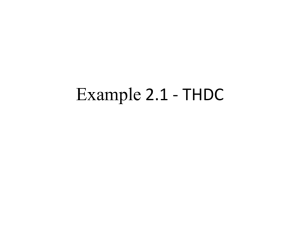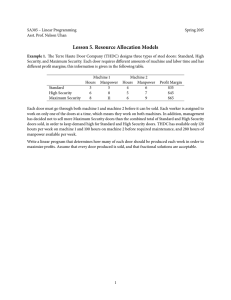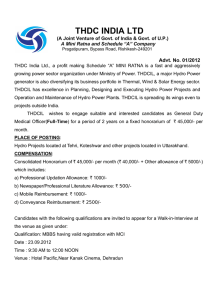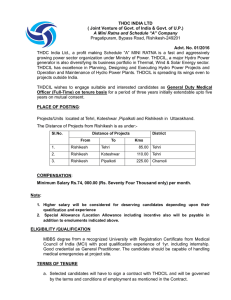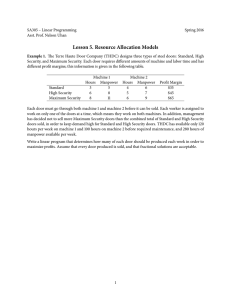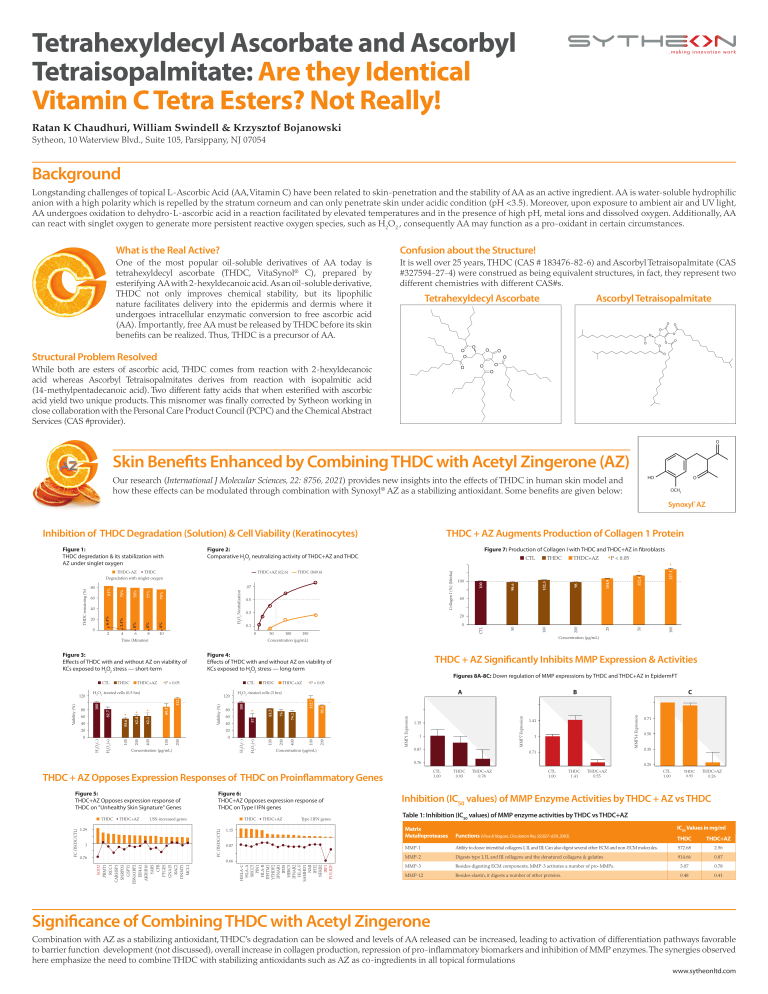
Tetrahexyldecyl Ascorbate and Ascorbyl Tetraisopalmitate: Are they Identical Vitamin C Tetra Esters? Not Really! Ratan K Chaudhuri, William Swindell & Krzysztof Bojanowski Sytheon, 10 Waterview Blvd., Suite 105, Parsippany, NJ 07054 Background Longstanding challenges of topical L-Ascorbic Acid (AA, Vitamin C) have been related to skin-penetration and the stability of AA as an active ingredient. AA is water-soluble hydrophilic anion with a high polarity which is repelled by the stratum corneum and can only penetrate skin under acidic condition (pH <3.5). Moreover, upon exposure to ambient air and UV light, AA undergoes oxidation to dehydro-L-ascorbic acid in a reaction facilitated by elevated temperatures and in the presence of high pH, metal ions and dissolved oxygen. Additionally, AA can react with singlet oxygen to generate more persistent reactive oxygen species, such as H2O2 , consequently AA may function as a pro-oxidant in certain circumstances. What is the Real Active? Confusion about the Structure! One of the most popular oil-soluble derivatives of AA today is tetrahexyldecyl ascorbate (THDC, VitaSynol® C), prepared by esterifying AA with 2-hexyldecanoic acid. As an oil-soluble derivative, THDC not only improves chemical stability, but its lipophilic nature facilitates delivery into the epidermis and dermis where it undergoes intracellular enzymatic conversion to free ascorbic acid (AA). Importantly, free AA must be released by THDC before its skin benefits can be realized. Thus, THDC is a precursor of AA. It is well over 25 years, THDC (CAS # 183476-82-6) and Ascorbyl Tetraisopalmitate (CAS #327594-27-4) were construed as being equivalent structures, in fact, they represent two different chemistries with different CAS#s. Tetrahexyldecyl Ascorbate Ascorbyl Tetraisopalmitate Structural Problem Resolved While both are esters of ascorbic acid, THDC comes from reaction with 2-hexyldecanoic acid whereas Ascorbyl Tetraisopalmitates derives from reaction with isopalmitic acid (14-methylpentadecanoic acid). Two different fatty acids that when esterified with ascorbic acid yield two unique products. This misnomer was finally corrected by Sytheon working in close collaboration with the Personal Care Product Council (PCPC) and the Chemical Abstract Services (CAS #provider). O Skin Benefits Enhanced by Combining THDC with Acetyl Zingerone (AZ) HO Our research (International J Molecular Sciences, 22: 8756, 2021) provides new insights into the effects of THDC in human skin model and how these effects can be modulated through combination with Synoxyl® AZ as a stabilizing antioxidant. Some benefits are given below: O OCH3 Synoxyl® AZ Inhibition of THDC Degradation (Solution) & Cell Viability (Keratinocytes) Figure 1: THDC degredation & its stabilization with AZ under singlet oxygen Figure 7: Production of Collagen I with THDC and THDC+AZ in fibroblasts Figure 2: Comparative H2O2 neutralizing activity of THDC+AZ and THDC n CTL Concentration (µg/mL) FC (THDC/CTL) 1.29 1 0.76 Type I IFN genes 1.15 0.87 HHLA-C HLA-A XRCC5 PIN1 HLA-B ITFITM1 YTHDF2 IFNAR1 IFI35 HERC5 IFNAR2 HLA-F SAMHD1 NMI IFIT2 NFKB2 IRF1 POLR2F 0.66 SOD2 PRMT1 RCC1 CARHSP1 SNRPD3 GSPT1 EBNA1BP2 EIF4A1 AKR1B10 YARS CFB PTGES GNA15 RAC2 DNMT1 MCL1 FC (THDC/CTL) n THDC • THDC+AZ 100 B C MMP7 Expression MMP1 Expression 93.4 200 112.7 100 74.1 76 Concentration (µg/mL) Figure 6: THDC+AZ Opposes expression response of THDC on Type I IFN genes USS-increased genes 50 *P < 0.05 1.15 1 0.87 1.41 1 0.71 0.71 0.50 0.35 0.25 CTL 1.00 THDC + AZ Opposes Expression Responses of THDC on Proinflammatory Genes n THDC • THDC+AZ 127.1 104.9 25 Figures 8A-8C: Down regulation of MMP expressions by THDC and THDC+AZ in EpidermFT 0.76 Figure 5: THDC+AZ Opposes expression response of THDC on "Unhealthy Skin Signature" Genes 112.4 98 200 102.3 THDC + AZ Significantly Inhibits MMP Expression & Activities A 400 200 100 400 200 0 n THDC+AZ 200 40 0 n THDC 57 60 * H2O2(+) 80 20 100 Concentration (µg/mL) H2O2-treated cells (3 hrs) H2O2(-) Vaibility (%) 89.3 * 20 H2O2(+) 150 MMP14 Expression n CTL 100 *P < 0.05 112 40 * 62.1 55.6 * 100 Figure 4: Effects of THDC with and without AZ on viability of KCs exposed to H2O2 stress — long-term 120 62.4 82.7 60 50 Concentration (µg/mL) n THDC+AZ 100 80 100 0 H2O2-treated cells (0.5 hrs) H2O2(-) Vaibility (%) 120 98.6 10 Figure 3: Effects of THDC with and without AZ on viability of KCs exposed to H2O2 stress ­­­— short-term n THDC 60 0 0.1 Time (Minutes) n CTL 50 8 *P < 0.05 20 83.5 6 0.3 100 4 • 0% 2 • 0% 0 • 0% 20 • 2.4% 40 0.5 100 100 H2O2 Neutralization 75% 77% 78% 79% 81% .07 • 6.4% THDC remaining (%) 60 n THDC+AZ * CTL — THDC+AZ (62.6) — THDC (849.6) • THDC Degradation with singlet oxygen 80 n THDC * Collagen I (%) (Media) n THDC+AZ THDC + AZ Augments Production of Collagen 1 Protein THDC 0.93 THDC+AZ 0.78 CTL 1.00 THDC 1.41 THDC+AZ 0.55 CTL 1.00 THDC 0.93 THDC+AZ 0.26 Inhibition (IC50 values) of MMP Enzyme Activities by THDC + AZ vs THDC Table 1: Inhibition (IC50 values) of MMP enzyme activities by THDC vs THDC+AZ IC50 Values in mg/ml Matrix Metalloproteases Functions (Visse & Nagase, Circulation Res, 92:827–839, 2003) MMP-1 THDC THDC+AZ Ability to cleave interstitial collagens I, II, and III; Can also digest several other ECM and non-ECM molecules. 572.68 2.56 MMP-2 Digests type I, II, and III collagens and the denatured collagens & gelatins 914.66 0.87 MMP-3 Besides digesting ECM components, MMP-3 activates a number of pro-MMPs. 3.07 0.78 MMP-12 Besides elastin, it digests a number of other proteins. 0.48 0.41 Significance of Combining THDC with Acetyl Zingerone Combination with AZ as a stabilizing antioxidant, THDC’s degradation can be slowed and levels of AA released can be increased, leading to activation of differentiation pathways favorable to barrier function development (not discussed), overall increase in collagen production, repression of pro-inflammatory biomarkers and inhibition of MMP enzymes. The synergies observed here emphasize the need to combine THDC with stabilizing antioxidants such as AZ as co-ingredients in all topical formulations www.sytheonltd.com
